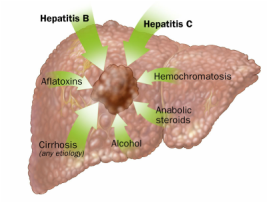
Having dedicated more than a decade to Celsion Corporation, Raj Prabhakar has been heavily involved in liver cancer research and development. Raj Prabhakar oversaw Phase III clinical trials for the treatment of hepatocellular carcinoma (HCC), the most common type of liver cancer.
HCC is the third-leading cause of cancer-related deaths. While it is unclear what cells cause HCC, studies indicate the condition may derive from hepatic stem cells. The illness predominantly affects patients with underlying chronic liver disease and cirrhosis. The latter develops in people who have nonalcoholic fatty liver disease (NAFLD) or nonalcoholic steatohepatitis (NASH), which becomes a problem with the onset of Type 2 diabetes and hypertension.
Patients with HCC develop tumors that can be identified during routine screenings. Likewise, the masses may cause various symptoms due to location and size, which will alert a person to see a physician. Depending on the individual, an HCC tumor can form as a single mass or diffuse growth. Ablation therapy and surgical resection are options for removing cancerous tumors to avoid liver failure or more severe outcomes.
HCC is the third-leading cause of cancer-related deaths. While it is unclear what cells cause HCC, studies indicate the condition may derive from hepatic stem cells. The illness predominantly affects patients with underlying chronic liver disease and cirrhosis. The latter develops in people who have nonalcoholic fatty liver disease (NAFLD) or nonalcoholic steatohepatitis (NASH), which becomes a problem with the onset of Type 2 diabetes and hypertension.
Patients with HCC develop tumors that can be identified during routine screenings. Likewise, the masses may cause various symptoms due to location and size, which will alert a person to see a physician. Depending on the individual, an HCC tumor can form as a single mass or diffuse growth. Ablation therapy and surgical resection are options for removing cancerous tumors to avoid liver failure or more severe outcomes.
 RSS Feed
RSS Feed
